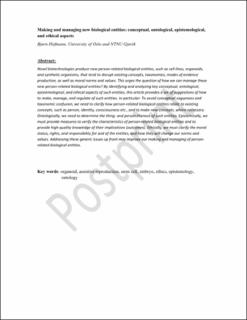Making and Managing New Biological Entities: conceptual, ontological, epistemological, and ethical aspects
Peer reviewed, Journal article
Accepted version
Permanent lenke
https://hdl.handle.net/11250/3120649Utgivelsesdato
2023Metadata
Vis full innførselSamlinger
Sammendrag
Novel biotechnologies produce new person-related biological entities, such as cell lines, organoids, and synthetic organisms, that tend to disrupt existing concepts, taxonomies, modes of evidence production, as well as moral norms and values. This raises the question of how we can manage these new person-related biological entities. This article identifies and analyzes key conceptual, ontological, epistemological, and ethical aspects of such entities in order to suggest how to make, manage, and regulate them. It argues that in order to avoid conceptual vagueness and taxonomic confusion, it is important to clarify how person-related biological entities relate to existing concepts and to make new concepts where necessary. Ontologically, we need to determine the thing- and person-likeness of such entities. Epistemically, we must provide measures to verify the characteristics of person-related biological entities and to provide high-quality knowledge of their implications (outcomes). And ethically, we must clarify the moral status, rights, and responsibility for and of the entities, and how they will change our norms and values. Addressing these issues up front may improve our making and managing of person-related biological entities.

